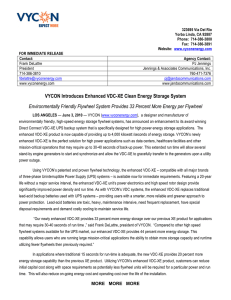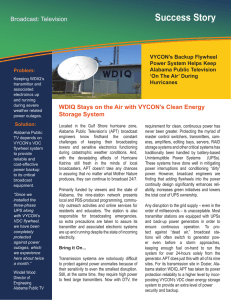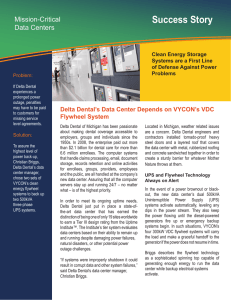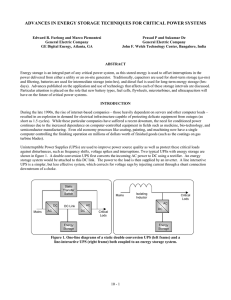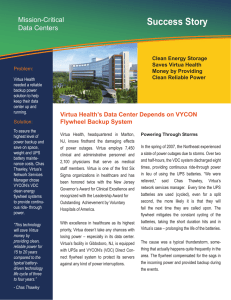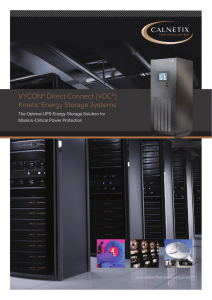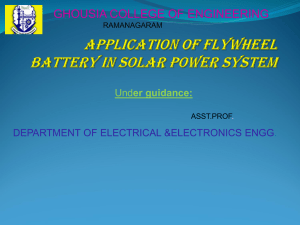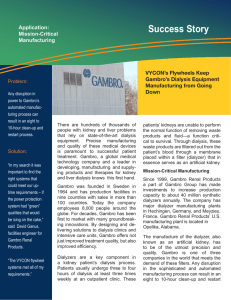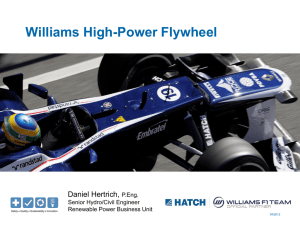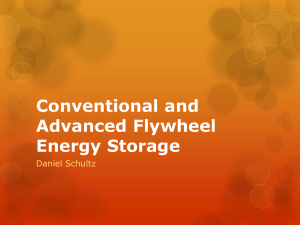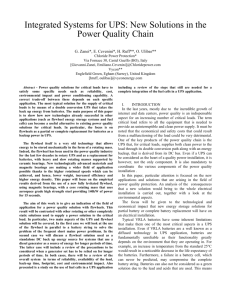Alternative DC storage Examples
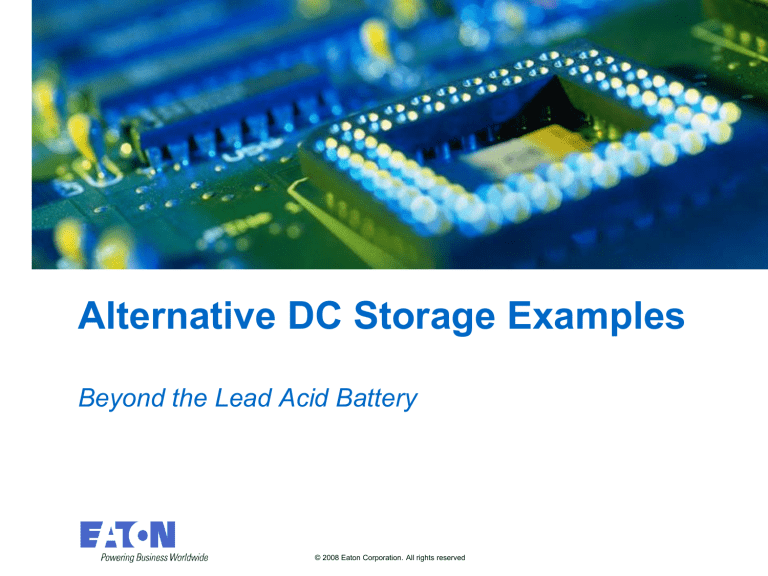
This is a photographic template – your photograph should fit precisely within this rectangle.
Alternative DC Storage Examples
Beyond the Lead Acid Battery
© 2008 Eaton Corporation. All rights reserved .
Power Quality Applications
Typical UPS system block diagram
Genset
AC
Automatic
Transfer Switch ATS
Long-term AC alternate source
Double Conversion UPS System
Rectifier
AC/DC
Inverter
DC/AC
540 VDC
480
VAC
Utility
AC
Critical
AC output
DC Energy Storage
2
2
Alternatives to Standard Storage
3
3
Alternatives to Standard Storage
Generator
Preferred method to provide long ridethrough (5-48 hours)
Maintenance is required
Noise and exhaust are concerns
Be sure to size properly with UPS
Vendor should have UPS interface experience
4
4
Alternatives to Standard Storage
Batteries
For now, batteries are the least expensive mid- term solution
They can also be the weakest link
Service life is always an issue
Hazardous materials disposal is a challenge
Frequent testing and constant monitoring is a requirement
Size and weight are inconvenient in a datacenter
5
5
Flywheel DC Energy Storage
• Can be deployed as the primary DC source or in parallel with traditional batteries in a Battery Hardening configuration.
• It is different from typical chemical batteries in that frequent cycles do not reduce its life
• Produces high power output for short durations (20 – 90 seconds)
6
6
UPS TOPOLOGIES
7
7
1 x 160KVA/144kW UPS
1 VDC XE flywheel
No Batteries
TV Broadcast
Selection Criteria
Green initiative
Improved reliability
Do not like batteries
Floor space / footprint
8
8
Decatur Memorial Hospital IL IT Application
1 x 160KVA/144kW UPS
1 VDC XE flywheel
No Batteries
Selection Criteria
• Green initiative
• Improved reliability
• Do not like batteries
• Floor space / footprint
9
9
University of Florida Proton Therapy Institute - Gainesville
2 x 750KVA/675kW UPS
8 VDC XE flywheels
No Batteries
Selection Criteria
Small footprint
Reduced Maintenance Cost
10
10
Gundersen Lutheran Hospital - IT Application
Strives for 100%
Renewable Energy
The hospital, based in La Crosse,
Wis., is halfway toward its 2009 goal, which amounts to $409,000 in annualized savings
1 x 550KVA/495kW UPS
2 +1 future VDC XE flywheels
No Batteries
Selection Criteria
Small footprint
Green / Sustainability
Reliability
Reduced Maintenance Cost
11
11
University of Massachusetts Medical School - Data Center
2 x 825KVA / 750kW UPS
8 VDC XE VYCON Flywheels
No Batteries
Selection Criteria
Small footprint
Green / Sustainability
Reduced Maintenance Cost
Reliability
12
12
Delta Dental Insurance - Data Center
Selection Criteria
Floor space / footprint
Redundancy
Extend battery life
Improved system reliability
Ride through to Generator
Battery Hardening
2 x 500kVA / 450kW UPS
4 VDC XE VYCON Flywheels
Batteries
Dual Bus
13
13
Bremerton Naval - Modular Solution for IT
825kVA / 750kW UPS
5 VDC XE Flywheels
Outdoor Enclosure
Selection Criteria
Floor space / footprint
HVAC requirement reduced
Reduced maintenance
Improved system reliability
Ride through to Generator
14
14
The Principles of Kinetic Energy
KE ~ m (rpm)
²
(for rotational motion)
•
Low Speed
• More mass means more energy
• Double mass = double energy
• “Low-speed” 1800 to 8000RPM
•
High Speed
• More energy by higher rpm
• Double rpm = quadruple energy
• “High-speed” 36000 to 55000RPM
All Flywheels are operated well below their design limitations
15
15
Flywheel Technology Evolution
•
First Generation Design -
• Low speed (8,000 RPM)
• High maintenance with down time required
• Lengthy commissioning and start up procedure
• Large flywheel mass (800 LBS)
• High standby power losses
• Bearings
16
16
Active Power FLYWHEEL
250kW Motor/Generator/Flywheel
Field replaceable ball-bearing cartridge
Field coil
Magnetic bearing integrated into field circuit
Flywheel, motorgenerator rotor
Air-gap armature
Smooth back-iron, no slots and low loss
No permanent magnets enables high tip-speed and high output power
17
17
Flywheel Technology Evolution
•
Second Generation Design
• Ultra high speed - 52,000RPM
• Liquid cooled - circulation pump
• Mid range power density
• Small composite flywheel mass (60 Lbs)
• No recovery from drop out event
• Down time to service internal vacuum / filter
• Bi Annual service with shut down year 1
18
18
Flywheel Technology Evolution
•
Third Generation Design – VYCON
• High speed - 36000 RPM
• Air cooled
• Small steel alloy flywheel mass (120lbs)
• Annual service requirement
• 15 mins.
• no down time
• High power density
• Full recovery from drop out event
19
19
High Speed, Steel Flywheel Module
Permanent Magnet Motor-Generator
Magnetic Levitation
20
20
VDC – Simplified One Line
IGBT Power Converter
Soft Start
To UPS
Battery
Input
Flywheel Module
DC Monitoring Motor Generator Controls
Power Conversion Module Controller Magnetic Levitation
Controller
Control
Panel
21
21
Battery Hardening
Battery “Whiplash” Prevented
Float Voltage
Grid Disturbance w/ flywheel
Nearly 99% of all voltage sags and outages last less than 8 seconds
Gen
Coup de fouet = Whiplash
98% of disturbances
< 10 sec.
0
10
20
Time
(Seconds)
• Flywheel provides voltage support eliminating battery whiplash
• Increasing battery life, Improving UPS reliability & Reducing service
22
22
Battery Hardening
23
23
Alternatives to Standard Storage
Supercapacitors, Turbines and Fuel Cells
All these promising technologies offer continuous power
But some can’t handle large step loads and many are rather inefficient
Typically too expensive vs. batteries (for now!)
Supercaps (some) utilize KOH electrolyte with same disadvantages as batteries
Acidic hazards
Disposal concerns
Gassing on overcharge
24
24
Comparison with other storage devices(1) item
Energy density
(Wh/kg)
Power density
(W/kg)
Discharge rate
Cycle Life
Shelf Life
Over discharge
Environment
Conventional
Capacitor
<0.1
10,000
~ 100,000
~ 0.1sec
>500,000
5 ~ 10year
○
○
EDLC
0.2
~ 10
100 ~ 5,000
0.1sec
~ 1min
>500,000
10 ~ 15year
○
○
Battery
( Lead-Acid )
10 ~ 40
50 ~ 130
10min ~ 10h
200 ~ 2,000
3 ~ 5year
×
×
Battery
( Li-ion
40 ~ 80
)
100 ~ 300
10min ~ 10h
~ 10,000
5 ~ 10year
×
△
25
25
Comparison with other storage devices(2)
Conventional Capacitor
Cup bucket
EDLC drum
Lead-Acid Battery
Water in the cup can be applied at one time but volume is not sufficient enough for fire fighting
Not applicable
Best option for fire fighting
Not applicable
Sufficient amount of water in the drum but can not be applied at one time for fire fighting
EDLC is best storage device for charge and discharge of large amount of electricity in a short period of time !
26
26
Dynamic Voltage Compensator (system)
Back up commercial power
EDLC high speed switch
Inverter
Load
Sag compensation mode
Rated Output
Dip comp. time
Rated Voltage
Operation
Switch over
Storage
Efficiency
10,000kVA
1sec
3φ 6,600V
On-line method
No interruption
( Less than 2msec )
EDLC over 99%
Module
600S1-70C-11P
292 × 600 × 395H
EDLC Panel System ( W : 28m-H:2.6m-D:2.3m
)
27
Application for Electric railway (system)
Regeneration & Peak cut
CAPAPOST ( W : 4.1m-H:3.1m-D:5.0m
)
EDLC Bank(600S1-70C × 36P × 8S )
28
Power System Stabilizer (system)
Peak cut & Regeneration
Electric Power system
~ junction
Power constant
Load fluctuation
Stabilize the sharp fluctuations by PSS engine generator
(assume) junction
+
EDLC
Load
SG SG
Load
DE DE to supply engine
Battery engine storage
自立範囲
EDLC
Storage
Input transformer
AC/DC
EDLC
AC6600V 100kVA
29
29
30
30
